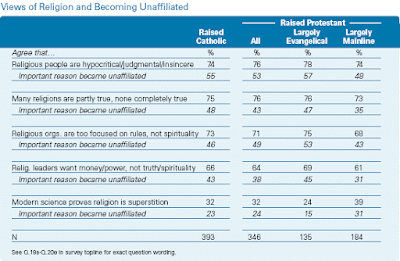Paradoxically, the unaffiliated have gained the most members in the process of religious change despite having one of the lowest retention rates of all religious groups. Indeed, most people who were raised unaffiliated now belong to a religious group. Nearly four-in-ten of those raised unaffiliated have become Protestant (including 22% who now belong to evangelical denominations), 6% have become Catholic and 9% are now associated with other faiths. Overall, 4% of the total U.S. adult population now belongs to a religious group after having been raised unaffiliated.So long as about 24% of us are non-theist, I will continue to sleep well at night:
Based on their stated beliefs rather than their religious identification in 2008, 70% of Americans believe in a personal God, roughly 12% of Americans are atheist (no God) or agnostic (unknowable or unsure), and another 12% are deistic (a higher power but no personal God).When you read the reasons for becoming religious after being raised non-religious, it's laughable for anyone religious to take comfort in these statistics: only half of new converts to religion from non-religion cite "spiritual needs" while the rest cite life contingencies -- a move to a new community, marrying someone from a faith, death and divorce. Isn't it wonderful how many people admit that tragedy is required to make them scared enough to believe in magic?
Compare this to those who used to be religious and now aren't:
 What I find completely unsurprising is that Evangelicals cite science as a motivating factor the least among other groups. You don't generally buy in to the whole Evangelical shebang if you are scientifically minded, so you won't be convinced by science that your religion is bullshit either.
What I find completely unsurprising is that Evangelicals cite science as a motivating factor the least among other groups. You don't generally buy in to the whole Evangelical shebang if you are scientifically minded, so you won't be convinced by science that your religion is bullshit either.Charles Blow finds this...encouraging? Or something? I love his quote:
While science, logic and reason are on the side of the nonreligious, the cold, hard facts are just so cold and hard. Yes, the evidence for evolution is irrefutable. Yes, there is a plethora of Biblical contradictions. Yes, there is mounting evidence from neuroscientists that suggests that God may be a product of the mind. Yes, yes, yes. But when is the choir going to sing? And when is the picnic? And is my child going to get a part in the holiday play?So this is how religious people justify it. On the one hand you have Carl Sagan's outlook:
For me, it is far better to grasp the Universe as it really is than to persist in delusion, however satisfying and reassuring.And on the other hand, you have people who would much rather persist in satisfying, reassuring delusion because the facts are cold and hard. Or is this just atheist hubris?